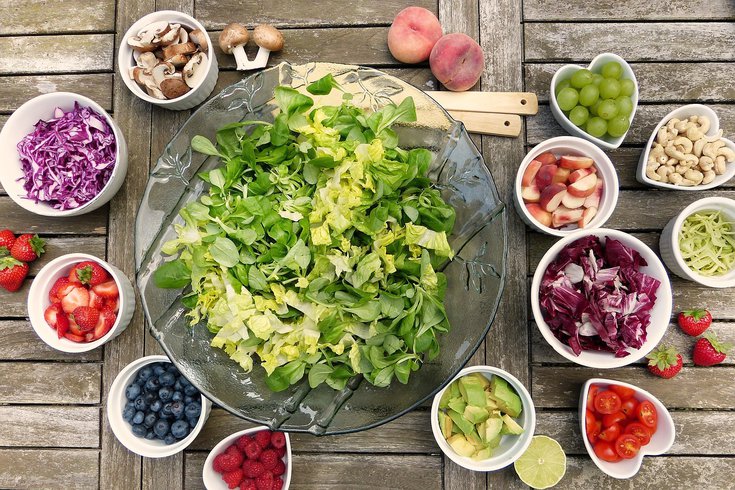
May 03, 2022
 Silvia Rita/Pixabay
Silvia Rita/Pixabay
Children who follow a vegetarian diet have similar growth and nutrition levels as those who eat meat, a study published in Pediatrics found. But they are more likely to be underweight.
As more Americans choose to follow a vegetarian diet, so are their children. But how safe is it for their growing bodies?
A new study offers parents reassurance that children who don't eat meat have similar growth and nutrition compared to those who do. But there was a caveat.
The research, which involved 8,907 Canadian children, also found that children who are vegetarian were almost twice as likely to be underweight – defined as below the third percentile for body mass index.
Being underweight could be a sign of undernutrition and raises questions about whether the quality of a child's diet is adequate enough to support normal growth, pediatricians say.
Children who follow a vegetarian diet should have access to health care providers who can provide monitoring and guidance to ensure proper growth and nutrition, the researchers said.
They added that their study, published in Pediatrics, didn't analyze the quality of the vegetarian diets, which can vary. More research is needed on this subject and the health impacts of a vegan diet.
The children in the study ranged in age from 6 months to 8 years old. They were categorized either as vegetarian – defined as following a meatless diet, including fish and poultry or non-vegetarian. Children in both categories had similar mean body mass index, height, iron, vitamin D and cholesterol levels.
International guidelines for babies and children following a vegetarian diet tend to differ, and previous studies on how such a diet affects growth and nutrition have offered conflicting results.
A 2010 Canadian study found that a well-balanced vegetarian or vegan diet is safe for children and adolescents, but supplementation may be needed in cases of strict diets where no animal products are consumed. The intake of protein and other essential vitamins and minerals, including iron, zinc, calcium and vitamins B12 and D should be closely monitored.
A 2021 study conducted in Poland found that children on a vegan diet were, on average, about 1.2 inches shorter than non-vegans of the same age and had some deficiencies in vitamin levels and bone mineral density.
Critics of this study said the findings weren't reflective of conditions in the U.S., where there is better education and more alternatives to meat and dairy products.
Current U.S. Dietary Guidelines recommend that parents feed babies and children a regular consumption of eggs, dairy products, soy products and nuts or seeds in addition to vegetables, fruits, beans and lentils, grains and oils.
In 2009, the American Dietetic Association stated that a well-planned vegetarian or vegan diet was safe for people at every stage of life, but also emphasized that fortified foods and supplements can help boost essential nutrients.
About 1 in 200 American youth follow a vegetarian diet, according to the U.S. Centers for Disease Control and Prevention study published in 2015. But estimates can vary depending on the type of survey conducted. One survey from the Vegetarian Resource Group estimated that about 1.5 million kids were vegetarian and 1% were vegan.
Not every vegetarian is exactly alike. Some vegetarians also choose not to eat eggs, but will eat dairy products. Others will eat eggs, but not dairy products. Vegans completely eschew all meat, poultry, fish, eggs, dairy and other animal products, including honey or gelatin.
Others choose instead to follow a flexitarian diet in which they don't consume red meat at all, but will sometimes eat some fish or chicken. People who eat a mostly vegetable-based diet but also eat fish and seafood are called pescatarians.
Children who are vegetarian often are raised on the diet, but sometimes older kids will choose to become vegetarian on their own because of concerns for animals, the environment or their own health.
Most pediatricians say that a vegetarian diet can be a healthy choice for people of all ages, including babies and young children, as long as their diets are carefully planned to avoid any nutritional deficiencies.
The overall rule of thumb is to make sure vegetarian children are getting plenty of fruits and vegetables, whole grains, nuts, seeds and legumes while avoiding processed foods, which tend to be low in nutrition.
The guidelines for the introduction of solid foods in the U.S. are the same for both vegetarian and non-vegetarian infants. Breastfed babies 6 months and older should get iron from foods such as iron-fortified infant cereal. And once they start eating solids, their diet should include protein-rich vegetarian foods including puréed tofu, cottage cheese, yogurt or soy yogurt, and puréed and strained beans, split peas, chickpeas and lentils.
Toddlers are notorious for being picky eaters. To ensure a vegetarian toddler is getting adequate nutrition, nutrition experts say to use snack time to offer more healthy options between meals.
Important nutrients for vegetarians include vitamin B12, which is found in dairy products, eggs and fortified cereals; vitamin D, which is found in milk and vitamin D-fortified orange juice; calcium, protein and iron. Dark leafy vegetables, broccoli, whole grains, dried fruits are also good options to meet nutritional requirements.
Parents who are concerned that their child may need a vitamin or mineral supplement are advised to talk to their child's pediatrician.
Here are some more healthy eating tips from the American Academy of Pediatrics.